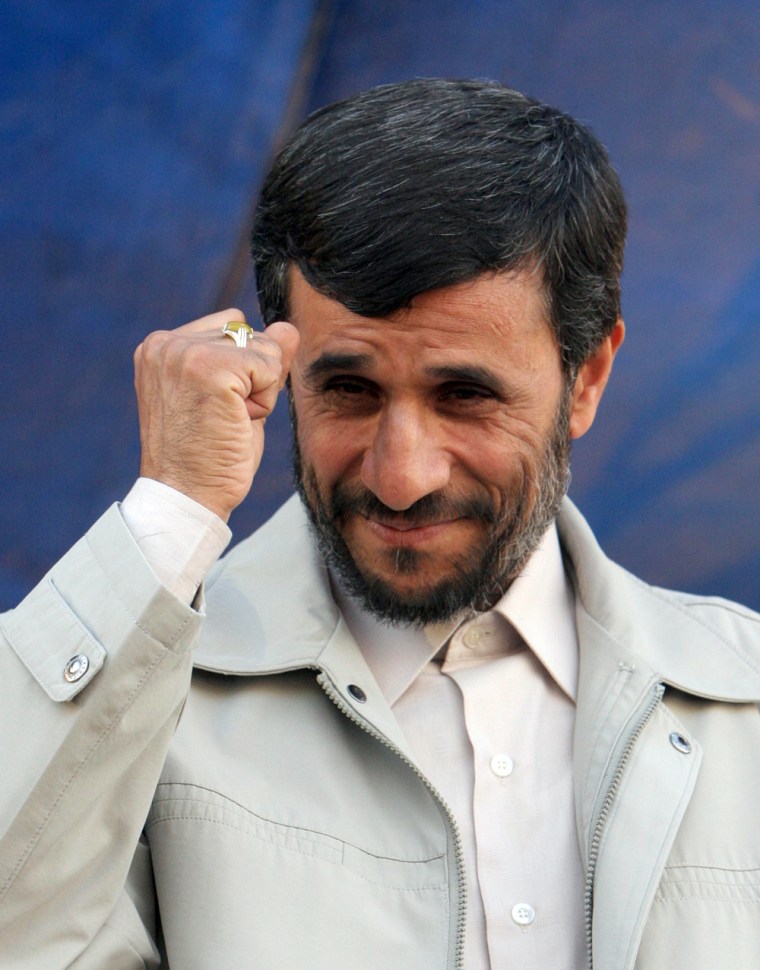Six world powers agreed Friday to pursue possible U.N. sanctions against Iran over its nuclear program, but left crucial questions about the scope and timing of any measures unresolved.
Top diplomats from the United States, Britain, France, Germany, China and Russia said in a joint statement after talks in London that they were “deeply disappointed” by Tehran’s refusal to suspend uranium enrichment, a key step toward making nuclear weapons.
Apparently divided about how quickly to move, the envoys stopped short of explicitly declaring European negotiations with Iran a failure, as some had expected them to do.
Their statement also shied away from demanding Tehran be punished by the U.N. Security Council, but said they would discuss sanctions in talks at the U.N.
U.S. Undersecretary of State Nicholas Burns went further.
“The decision has been made that we’ll go for sanctions, the question is what the sanctions will be,” he said after the meeting. “In the view of the United States, we have to move for sanctions to raise the stakes for Iran.”
Reading the diplomats’ joint statement, British Foreign Secretary Margaret Beckett said Iran had two choices when the United Nations demanded it halt enrichment activities.
“We regret that Iran has not yet taken the positive one,” she said.
Beckett said the six powers “will now consult on measures under Article 41 of Chapter 7 of the U.N. Charter.” Article 41 authorizes the Security Council to impose nonmilitary sanctions such as completely or partially severing diplomatic and economic relations, transportation and communications links.
Russian Foreign Minister Sergey Lavrov said the discussions on how to win Iranian compliance would take place at the Security Council, Russian news agencies reported. German Foreign Minister Frank-Walter Steinmeier told ZDF television the powers would begin drafting a resolution.
Meetings next week
Burns said political directors of the six nations’ foreign ministries would hold a videoconference Tuesday or Wednesday, and their U.N. ambassadors would then meet, probably the following day.
Britain’s U.N. ambassador said Thursday that he expected “the Iran dossier” to return to the Security Council in the next week, but Beckett set no timeframe for action.
Iran insists its enrichment of uranium is purely for peaceful purposes to be used for nuclear energy. But the United States and many European nations believe Iran is seeking to produce nuclear weapons.
The U.S. and Britain are leading the push for sanctions against Tehran. To avoid alienating the Russians and the Chinese — both major commercial partners of Iran — any measures are likely to be relatively mild, including embargoes on missile and nuclear technology, and possible travel bans and other penalties on Iranian officials involved in their country’s nuclear program.
Secretary of State Condoleezza Rice was delayed leaving Iraq on Friday because of mechanical difficulties with her plane, meaning the diplomats had little time to reach a consensus. But even before the logistical problems arose, it was clear there were significant differences among the participants, with Russia voicing reluctance to move toward sanctions and Rice suggesting it was “getting pretty close” to the time to take Iran to the Security Council.
“There is an issue of the credibility of the Security Council and the international system and you simply can’t just keep talking with no outcome,” she told reporters on her way to London.
Moscow loosening up?
Lavrov, who said Thursday that sanctions now would be “extreme,” hinted Friday that Moscow might accept some action. “We do not rule out additional measures” the Interfax news agency quoted him as saying in London.
But his deputy, Alexander Alexeyev, warned that it would be “counterproductive” to speak to Iran “in the language of threats and ultimatums.”
Beckett denied suggestions the five permanent U.N. Security Council members and Germany had been unable to agree on a course of action. She told The Associated Press that the international community was united in wanting to negotiate with Iran and urging it to suspend enrichment.
“None of us want to get involved in sanctions, but at the present time, Iran is not responding to probably the most generous offer that has ever been made by the international community,” she told the AP.
She said the package of technological and political incentives the six countries offered Iran in June was still on the table if it commits to freezing enrichment, which it has refused to do.
The European-Iranian negotiations had been seen as a final attempt to avoid a full-blown confrontation between Tehran and the Security Council after it ignored an Aug. 31 deadline to suspend uranium enrichment or face punishment.
Iranian President Mahmoud Ahmadinejad was defiant Thursday, saying his country would not be intimidated into giving up its nuclear program.
